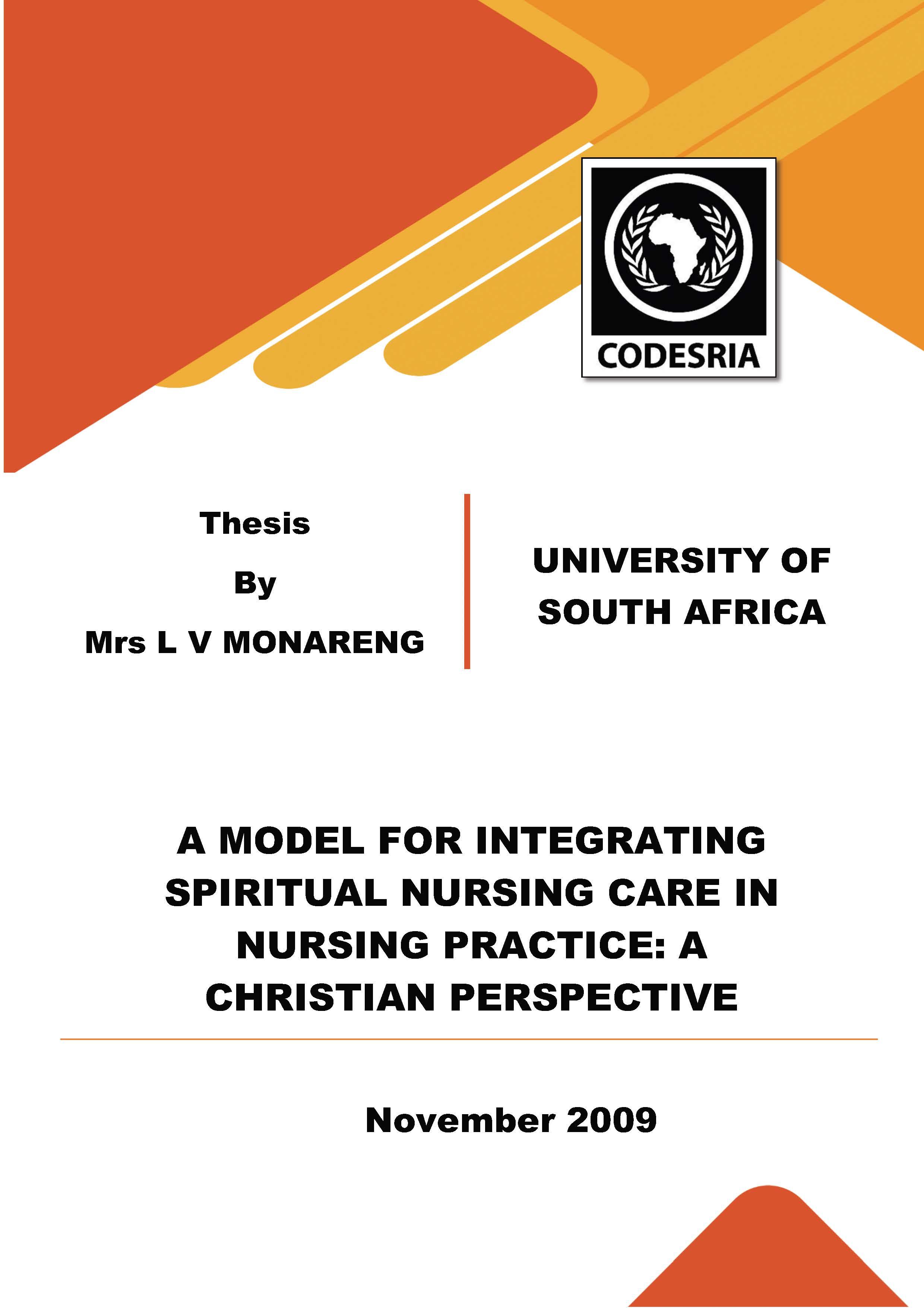A MODEL FOR INTEGRATING SPIRITUAL NURSING CARE IN NURSING PRACTICE: A CHRISTIAN PERSPECTIVE
Keywords:
Clinical practice, Christian perspective, Integrate, model, nurse, nursing practice, piritual nursing careSynopsis
A qualitative, grounded theory study was undertaken to explore and describe how nurses conceptualise spiritual nursing care, and how they integrate spiritual nursing care in practice. An in-depth literature review through concept analysis on the phenomenon was conducted to assist the researcher with theoretical sensitivity and theoretical saturation. Indepth
Individual interviews and focus group interviews were conducted to generate data. Interviews were audio-taped and transcribed by the researcher verbatim. Symbolic Interactionism was the philosophical base for the study. Data analysis was done through the use of the NUD*Ist computer soft ware programme version 4.0. The direct quotes of participants were coded and arranged into meaning units for analysis. A constant comparison method of data analysis was applied by following a process of open, axial and selective coding. Tech’s (1990:142-145) eight steps of analysis to analyse textual qualitative data was used until themes, categories and subcategories were identified and developed. Data analysis revealed that nurses had difficulty to differentiate spiritual nursing care from emotional, psychological or religious care. Nurses still felt inadequately prepared educationally on how to integrate spiritual nursing care in nursing practice. A Humane Care Model and practice guidelines were developed to guide nurses in clinical practice on how to provide such care. Recommendations proposed that the matter be taken up by nurse managers, educators and nurse clinicians to guide nurses in this regard.
Downloads
References
Ahern, KJ. 1999. Ten tips for reflexive bracketing. Qualitative Health Research, 9:407-411.
Armstong, K. 2008. What is transcendence? From: http://www.selftrabscendence.org/self_transcendance/what is self transcendence/(accessed on 29.06.2008).
Babbie, E. 2007. The practice of social research. 11th edition. Belmont, CA: Thomson Wadsworth.
Babbie, E & Mouton, J. 2001. The practice of social research. South African edition. Cape Town: Oxford University Press.
Baldacchino, D & Draper, P. 2001: Spiritual coping strategies: a review of nursing literature. Journal of Advanced Nursing, 34(6):833-839.
Bassett, C (ed.). 2004: Qualitative research. In Qualitative research in health care. London: Whurr Publishers.
Bash, A. 2004: Spirituality: the emperor’ new clothes? Journal of Clinical Nursing, 13(1):11-16.
Benton, DC. 1996. Grounded theory. In The research process in nursing. 3rd edition, edited by DSF Cormack. London: Blackwell Science.
Benzein, E, Norberg, A & Saveman, B. 1998: Hope; future imagined reality. The meaning of hope as described by a group of healthy Pentecostalists. Journal of Advanced Nursing, 28:1063-1070.
Bezuidenhout, MC. 2009. Leadership in health services management, edited by K Jooste. Second edition. Lansdowne:Juta.
Blackwell’s Nursing Dictionary. 2005: London: Blackwell.
Blumer, H. 1969: Symbolic interactionism: perspective and method. Eaglewood Cliffs, NJ: Prentice-Hall.
Blumer, H. 1971: Sociological implications of thoughts of GH Mead, in School and society, edited by Cosin, BR. Milton Keynes: Open University Press.
Blumer, H. 1986. Symbolic interactionism: perspective and method. California: University of California.
Boero, ME, Caviglia, ML, Monteverdi, R, Braida, V, Fabello, M & Zorzella, LM. 2005.
Spirituality of health workers: a descriptive study. International Journal of Nursing Studies,42:915-921.






